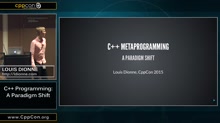RAII versus Exceptions--Arne Mertz
There is no fight, is there?
RAII versus Exceptions
by Arne Mertz
From the article:
Recently I received a question on Twitter whether to prefer RAII over Exceptions. I have seen similar questions being asked again and again over time, so there seems to be some need for clarification...

 Have you registered for CppCon 2016 in September? Don’t delay –
Have you registered for CppCon 2016 in September? Don’t delay –  Have you registered for CppCon 2016 in September? Don’t delay –
Have you registered for CppCon 2016 in September? Don’t delay –